#the evil death generals and the seven kingdoms
Text
m E: *TAKES DEEP brEATH*
ME: I LOV-
anyone who has spent five seconds around me ever: yes, you love DIGIMON XROS WARS, we get it okay, you love *XROS WARS*, /XROS WARS/ *HAS BEEN* a Brightest f*CKING Starshine in your LIFE, you f*cking ADORE{/D} IT {/SINCE THE 1ST EP?-}, yes okay yes, you love XROS WARS!!!, HOW many times are we gonna go through this, yOU F*CKING LOVE XROS WARS ACTUALLY AND *IT'S OK FOR YOU, AS A "DIGIMON FAN", TO /LOVE/ OR EVEN JUST PLAIN ENJOY THE XROS WARS SERIES AND CHARACTERS* EVEN IF THE SERIES HAS LONG SINCE "FINISHED"!!!!
#digimon xros wars#digimon: xros wars#digimon xros wars: the evil death generals and the seven kingdoms#digimon hunters#digimon young hunters#digimon xros wars: the young hunters who leapt through time#the young hunters who leapt through time#kudou taiki#aonuma kiriha#amano nene#tsurugi zenjirou#hinomoto akari#akashi tagiru#mogami ryouma#xros wars chosen#xros heart#izzyizumi brighteststarshine#izzyizumi posts#dgmn brighteststarshine#izzyizumi jokeposts#(THIS IS A ME POST OK)#(ITS For ME)#(If You Don't Like It Please Move On)#(I just want this post on my DIGIBLOG for MANY DIGISerIES)#(I Was Here When Xros Wars Was Airing In JPN Tag yourself if you were TOO!!!)#(EVEN IF NOT Feel free to tag yourself if you appreciate it Hehe)#(I cant add blogrules to this But I Still Have Them)#(Please interact respectfully or dont re blog Thankyou)
10 notes
·
View notes
Photo
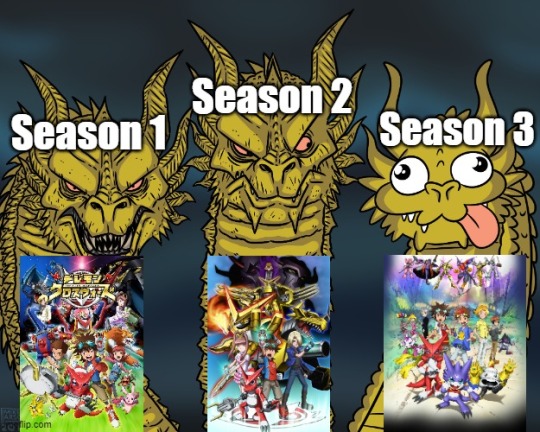
Yeah I don't really have anything new or interesting to say about hunters other than it's a pretty big downgrade in comparison to the previous two xros wars seasons... and the worst sequel series the anime has made... and so far the worst episodic season of digimon (though there's only two of those so far with the other one being ghost game).
#digimon#digimon xros wars#digimon fusion#digimon hunters#digimon xros wars: the young hunters who leapt through time#digimon xros wars: the evil death generals and the seven kingdoms
13 notes
·
View notes
Text
I was thinking about how, in fanfictions and in the fandom in general, Elrond is often depicted as a pure Noldorin lord, if not a die hard Fëanorian. And while I do enjoy Fëanorian!Elrond, the more I think about it the more I am convinced Elrond is not the fëanorian one of the twins. Elros is. Elros who adopted seven eight pointed stars as the heraldic device of his whole dynasty, a symbol still used 6000 years after his death. Elros who had Quenya be the official language of Númenor. Elros who decided to leave Arda for an unknown fate after his death; not Everlasting Darkness but not the rebirth in the bliss of Valinor either. He choose to go to a place Elves aren’t supposed to go, just like Fëanor and his sons went back to Beleriand. Elros, the mortal man, who decided to forge his own path in the world.
And I am not saying Elrond didn’t, because Eru knows how much strength, patience and stubbornness Elrond must have to become who he is in LotR. But when I first re-read LotR after reading the Silm, he did not strike me as Fëanorian at all (except for the no oath swearing rule that seems to apply in Rvendell). In fact, Elrond, and all three of his children, are defined by being half-Elven. Elrond is so much at the same time they had to creat a whole new category for him. He is described as kind as summer in The Hobbit, but also old and wise, and his friendly banter with Bilbo in FotR show he is also merry and full of humour. Elrond is both Elf and Man despite his immortality, and this is made quite clear in the text.
But. If I had to link him to an Elven clan, I’d say Elrond is more Sinda than Noldor, and even that is up to debate. Rivendell, this enchanting valley hidden from evil thanks to his power, is like a kinder version of Doriath. Yet, the name of Last Homely House and Elrond’s boundless hospitality make me think of Sirion: Rivendell is a place where lost souls can find s home, where multiple cultures live along each other in friendship and peace.
In FotR, Elrond introduces himself as the son of Eärendil and Elwing, claiming both his lineages instead of giving only his father’s name as is tradition amongst the Elves. It may be a political move, or it may be a genuine wish to claim his duality, his otherness, or even both at the same time. But from what is shown of Elrond in LotR, he seems to lean heavily in the symbols and heritage from the Sindar side of his family, rather than the Noldor one. I already gave the comparison with Doriath, but it seems history repeats itself as Arwen, said to be Lúthien reborn, chooses a mortal life. Yet Elrond doesn’t make the same mistake as Thingol by locking his daughter in a tower and sending her suitor to a deathly quest. Yes, he asks Aragorn to first reclaim the throne of Gondor before marrying Arwen, but this isn’t a whim on his part or an impossible challenge. Aragorn becoming king means that Middle-Earth is free from the shadow if Sauron and Arwen will live in peace and happiness. Which sounds like a reasonable wish for a parent to me.
Anyways, I went on a tangent, what strikes me with Elrond is his multiple identity. Elrond certainly has habits or traits coming from his upbringing amongst the Fëanorians, and he loved Maglor despite everything. The fact he is a skilled Minstrel shows he did learn and cultivate skills taught by a Fëanorion, that he is not rejecting them. There is a passage at the end of RotK, in the Grey Havens chapter, where Elrond is described carrying a silver harp. Is this a last relic from Maglor? Possible.
But while Elros choose the path of mortality and showed clear Noldorin influences in the kingdom he built, Elrond is happy in his undefined zone he lives in. He is an Elf, he is a Man, he is Sinda and Noldo and heir to half a dozen lost cultures and two crowns. He is the warrior and the healer, the only one of his kind in Middle-Earth. And that is why I will never tire of this character and I love so much fanworks depicting him as nuanced and multiple yet always recognisable as Elrond.
#tolkien#the silmarillion#the lord of the rings#peredhil#half elves#elros#elrond and elros#elrond#elrond peredhel#one blorbo to blorb them all#half baked ramblings by a sleep deprived tolkien fan#tolkien meta
528 notes
·
View notes
Text
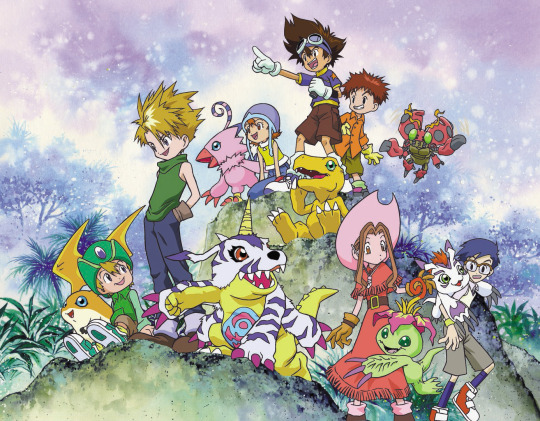

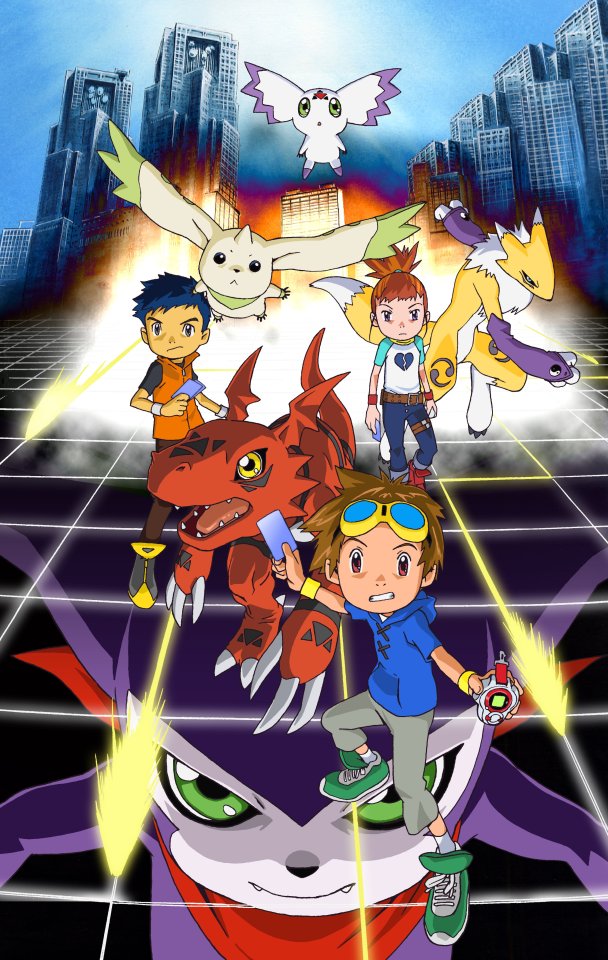
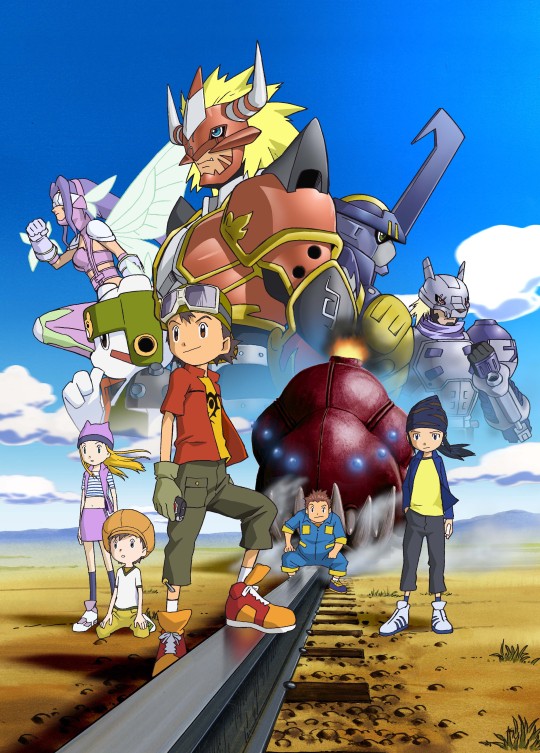



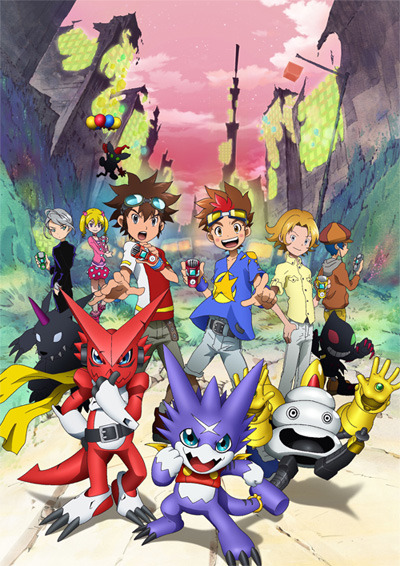



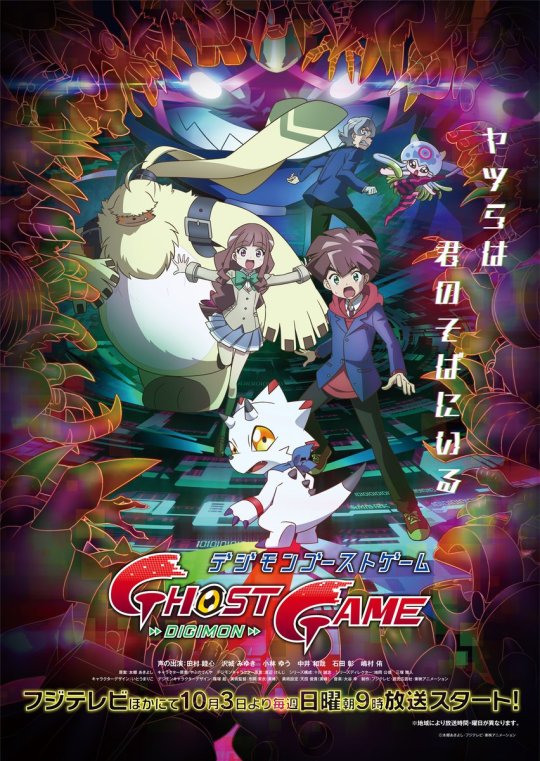














Digimon in all animated media - Anime, Movies and OVA
1st pic = Digimon Adventure anime (Japan: March 7, 1999 - March 26, 2000; USA: August 14, 1999 - June 24, 2000)
2nd pic = Digimon Adenture 02 anime (Japan: April 2, 2000 - March 25, 2001; USA: August 19, 2000 - May 19, 2001)
3rd pic = Digimon Tamers anime (Japan: April 1, 2001 - March 31, 2002; USA: September 1, 2001 - June 8, 2002)
4th pic = Digimon Frontier anime (Japan: April 7, 2002 - March 30, 2003; USA: September 9, 2002 - July 14, 2003)
5th pic = Digimon Savers / Data Squad anime (Japan: April 2, 2006 – March 25, 2007; USA: October 1, 2007 - November 2, 2008)
6th pic = Digimon Xros Wars / Fusion anime (Japan: July 6, 2010 - March 25, 2012; USA: September 7, 2013 - August 16, 2015)
7th pic = Digimon Xros Wars: The Evil Death Generals and the Seven Kingdoms anime (a.k.a Digimon Xros Wars part 2) (Japan: April 3, 2011 - September 25, 2011; USA: March 8, 2015 - August 16, 2015) **
8th pic = Digimon Xros Wars: The Young Hunters Who Leapt Through Time anime (a.k.a Digimon Xros Wars Hunters or Digimon Xros Wars part 3) (Japan: October 2, 2011 - March 25, 2012) ***
9th pic = Digimon Adventure Tri OVA (Japan: November 21, 2015 - May 5, 2018; USA: September 15, 2016 - September 20, 2018)
10th pic = Digimon Universe Appli Monsters anime (a.k.a Appmon) (Japan: October 1, 2016 - September 30, 2017)
11th pic = Digimon Adventure: (a.k.a Digimon Adventure 2020 or Digimon Adventure reboot) (Japan: April 5, 2020 - September 26, 2021; USA: November 19, 2022 - April 13, 2023)
12th pic = Digimon Ghost Game (Japan: October 3, 2021 - March 26, 2023)
13th pic = Digimon Adventure (Movie) short film (Japan: March 6, 1999; USA: October 6, 2000 as the first segment part of Digimon The Movie)
14th pic = Digimon Adventure: Our War Game! movie (Japan: March 4, 2000; USA: October 6 2000 as the second segment part of Digimon The Movie)
15th pic = Digimon Adventure 02: Vol. 1: Digimon Hurricane Landing!/Vol. 2: Transcendent Evolution! The Golden Digimentals movie (a.k.a Digimon Adventure 02 Vol 1 and 2) (Japan: July 8, 2000; USA: October 6, 2000 as the third segment part of Digimon The Movie) ****
16th pic = Digimon Adventure 02: Diablomon Strikes Back / Digimon: Revenge of Diaboromon movie (Japan: March 3, 2001; USA: August 5, 2005)
17th pic = Digimon Tamers: The Adventurers' Battle / Digimon: Battle of Adventurers movie (Japan: July 14, 2001; USA: October 16, 2005)
18th pic = Digimon Tamers: The Runaway Digimon Express / Digimon: Runaway Locomon movie (Japan: March 2, 2002; USA: October 2, 2005)
19th pic = Digimon Frontier: Revival of the Ancient Digimon!! / Digimon: Island of Lost Digimon movie (Japan: July 20, 2002; USA: October 23, 2005)
20th pic = Digital Monster X-evolution movie (Japan: January 3, 2005; USA: August 1, 2020)
21st pic = Digimon Savers The Movie: Ultimate Power! Activate Burst Mode!! movie (Japan: December 9, 2006)
22nd pic = Digimon Adventure 3D: Digimon Grandprix! short film OVA (Japan: July 20, 2000)
23rd pic = Digimon Savers 3D: The Digital World in Imminent Danger! short film OVA (Japan: July 8, 2006)
24th pic = Digimon Adventure 20th Anniversary Memorial Story Project OVA short films (Japan: November 22 2019 - December 25, 2020)
25th pic = Digimon Adventure: Last Evolution Kizuna movie (Japan: February 21, 2020; USA: September 29, 2020)
26th pic = Digimon Adventure 02: The Beginning movie (Japan: October 5, 2023; USA: November 8, 2023)
** This is the 2nd part of Digimon Xros Wars saga with Taiki, Kiriha and Nene on their adventure while Akari and Zenjirou are left out.
*** This is the 3rd part of Digimon Xros Wars saga with Tagiru, Yuu and Taiki as the protagonists. This 3rd part has the overly long title so we fans prefer to call it 'Digimon Xros Wars: Hunters' or 'Digimon Young Hunters'.
**** Yes, this movie has an overly long title. I had a hard time deciding whether to highlight it in bold or not.
Happy Digimon Day!
#Digimon#Digimon Adventure#Digimon Adventure 02#Digimon Tamers#Digimon Frontier#Digimon Savers#digimon data squad#Digimon Xros Wars#digimon fusion#Digimon Ghost Game#Appmon#digimon adventure 2020#picspam#digimon day#odaiba day#odaiba memorial day
112 notes
·
View notes
Text
[ 📹 Scenes from the destruction wrought by an Israeli occupation airstrike which targeted a vehicle being driven by 7 foreign aid workers belonging to the World Central Kitchen, killing all inside. Among the dead included foreign citizens of Britain, Poland, and Australia, along with a dual American and Canadian citizen. The aid organization said it had coordinated the movements of its personnel with the Israeli authorities, who knew the vehicle contained humanitarian aid workers.]
🇮🇱⚔️🇵🇸 🚀🚀🚙💥 🚨
ISRAELI OCCUPATION BOMBS FOREIGN AID WORKERS, CONTINUES BOMBING ACROSS GAZA ON DAY 179 OF GENOCIDE
On the 179th day of "Israel's" ongoing war of genocide in the Gaza Strip, the Israeli occupation forces (IOF) committed a total of 7 new massacres of Palestinian families, resulting in the deaths of no less than 71 Palestinians, mostly women and children, while another 102 others were wounded over the previous 24-hours.
In the latest occupation atrocity, the Zionist army bombed the vehicle of a group of Foreign aid personnel working for the World Central Kitchen (WCK), killing 7 employees, including 6 foreigners.
"World Central Kitchen is devastated to confirm seven members of our team have been killed in an IDF strike in Gaza," the organization said in a statement on its website.
According to the World Central Kitchen, despite coordinating the organization's movements with the Israeli occupation army, a convoy including two armored cars branded with the WCK logo and one soft-skin vehicle that were carrying the WCK team while it was traveling through a "deconflicted zone" was struck by an Israeli bomb, destroying at least one of the vehicles.
WCK says the team was leaving their Deir al-Balah warehouse, in the central Gaza Strip, where their teams unloaded more than 100 tons of humanitarian food aid brought to Gaza through a maritime route, when the convoy was targeted by Zionist forces.
“This is not only an attack against WCK, this is an attack on humanitarian organizations showing up in the most dire of situations where food is being used as a weapon of war. This is unforgivable,” World Central Kitchen CEO, Erin Gore is quoted as saying.
The seven foreign aid workers killed in the Zionist strike included citizens from Australia, Poland, the United Kingdom, as well as a dual-citizen of the United States and Canada, and one Palestinian.
“I am heartbroken and appalled that we—World Central Kitchen and the world—lost beautiful lives today because of a targeted attack by the IDF. The love they had for feeding people, the determination they embodied to show that humanity rises above all, and the impact they made in countless lives will forever be remembered and cherished,” Erin Gore added.
In response to the International outcry over the atrocity, the Israeli occupation authorities said they will be “carrying out an in-depth examination at the highest levels to understand the circumstances of this tragic incident.”
The World Central Kitchen has suspended its operations in Gaza as a result of the incident.
In yet another atrocity yesterday, the Israeli occupation army bombed the Iranian consulate building in the Syrian capital of Damascus, killing several high-level Iranian officials, including 7 military advisors of Iran's Islamic Revolutionary Guard Corps (IRGC).
In response to the strike, Iranian Supreme Leader, Ayatollah Seyyed Ali Khamenei said in an announcement issued on Tuesday that the "evil Zionist regime will regret" it's crime of assasinating Iran's military advisors in Syria.
The Iranian leader said that both Brigadier General Mohammad Reza Zahedi, a commander of the IRGC’s Quds Force, and his deputy, General Mohammed Hadi Haji Rahimi were killed in the strike, which targeted the Iranian consulate in Damascus, declaring the crime was perpetrated by the "usurping and dispicable" Zionist regime.
“The evil regime will be punished by our brave men. We will make them regret this crime and other ones, by God's will," the Iranian leader added.
As Israel's crimes spread outside the occupied Palestinian territories and the Gaza Strip, and into the wider West Asian region, the bombing inside Palestine continued unabated.
In just one example, local civil defense crews recovered the bodies of six Palestinians who were killed, including two children, along with a number of wounded civilians, following a Zionist occupation airstrike targeting the Zarub family home, located in the city of Rafah, in the south of the Gaza Strip.
In another atrocity, several Palestinians were killed and a large number wounded after occupation artillery shelling targeted a number of residential buildings in the city of Khan Yunis, also in the south of Gaza, focusing artillery fire on the eastern and central parts of the city.
Meanwhile, Zionist warplanes bombed the al-Bashir Mosque, in the city of Deir al-Balah, in the central Gaza Strip, martyring a several civilians, including the death of at least one child, and wounding at least 20 others, while also dealing significant damage to neighboring residential buildings.
Similarly, Zionist fighter jets fired several missiles that slammed into two residential homes in the Al-Zaytoun neighborhood, southeast of Gaza City, while occupation artillery shelling targeted the Tal al-Hawa neighborhood, along with the Sheikh Ajlin neighborhood, martyring three civilians and wounding six others.
Over the last day, as the Zionist occupation army withdrew from the Al-Shifa Medical Complex, located in the Al-Rimal neighborhood of Gaza City, which had been the largest and most well-equipped hospital in the entire Gaza Strip, a scene of mass destruction and carnage was revealed, with hundreds of bodies littering the hospital grounds, including some bodies discovered with handcuffed wrists, having been extra-judicially executed in cold-blood.
Among the bodies recovered from Al-Shifa were doctors and healthcare personnel, along with entire Palestinian families, which the Gaza Media Office says were just a small part of the roughly 400 citizens that were killed in two weeks of fighting near the hospital.
About another 900 Palestinians were arrested or detained by Zionist forces under suspicion of belonging to Resistance groups, while the Hospital buildings themselves were nearly completely destroyed, blown to pieces and left as scorched shells by the American bombs dropped on them by the Israeli occupation army.
As a result of "Israel's" ongoing war of genocide in the Gaza Strip, the infinitely rising death toll has now exceeded 32'916 Palestinians killed, more than 25'000 of which being among women and children, while an additional 75'494 others have been wounded since the start of the current round of Zionist aggression beginning on October 7th, 2023.
#source1
#source2
#source3
#source4
#source5
#source6
#source7
#videosource
@WorkerSolidarityNews
#gaza#gaza strip#gaza news#gaza war#gaza genocide#genocide in gaza#genocide#genocide of palestinians#israeli genocide#israeli war crimes#war crimes#crimes against humanity#israel#israeli occupation forces#israeli military#israeli occupation#palestine#palestine news#palestinians#free palestine#politics#israel palestine conflict#war#news#geopolitics#world news#global news#international news#breaking news#current events
114 notes
·
View notes
Note
Since death knows all the great seven and more, she definitely had some distain for some. Like Hades and Frollo
Certainly. Death saw them during their time when their perspective on life and their purpose began to change. So not long after when Death befriended the Epel's many many great Grandmother/ancestor. During this time, Death actually slowed down and began looking at the mortals and their lives. they saw many goods, but also terrible mortals.
Let's start with Hades. And Let's get the hierarchy clear. At the tippy top are Time and Space, and under them are Life and Death, and under them are the lesser gods. The lesser gods are any higher beings that were created by Life and Not Time or Space.
Hades is one of the underworld Gods that did not betray Y/n Death. And their partnership ended on a bittersweet note.
The Evil Queen- She was the first Mortal she ever started observing and was not happy. Death indeed thought the queen was beautiful when she was faced with a potential rival. She sought to snuff out the life of the innocent who could care less about the queen's vanity compaction. Y/n thought her death was well deserved, dying as an ugly old hag.
The Queen of Hearts- She was crazy, Death simply saw a tyrant, who used her temper tantrum to scare the obedience of her citizens. So Y/n may or may not have used their pendant to pretend to be human and start an uprising. Witch leads to the queen being beheaded herself. After that Death Left the white queen in charge.
Jafar- Death simply thought he was a man, who wanted to be heard. But that's where their mercy ends, As he did bring harm to good people. And tried to force a girl to love him with magic. But he is now a genie, so they had to wait a really long time to collect his soul.
Scar- (In this Au, the whole lion king characters are human beastman) Death saw him as a spoiled second prince, who knew nothing about running a kingdom. But he had good leadership skills and was very clever. He could have been a great general, or caption of the Royal guard.
Instead, he killed his brother, attempted to kill his nephew, and almost drove his kingdom to starvation.
The Sea Witch- Death knew she was a deal maker who targets those who are at their lowest, or in a desperate mindset. And made unfair wages on her victims. So death was more than happy to collect her soul when she tried to murder the two lovers. And death used her magic to undo the curse of all the victims of Ursula when she perished.
Maleficent- She is the only one of the Seven, as a mortal, meets death. And even mock them to their face. For she believed that she was so powerful that she could live forever. Since she compared her life span to humans, she thought herself immortal. And after spitting in Death's face, this did many things for her ego.
So much so that she gets offended when she's not invited to a random baby's birthday. And curse death upon said baby. So Y/n was happy to watch the fear in maleficent eyes as they came to collect them.
"And that is my experience on the great seven," Death said, as the Dorm leaders sat around their meeting table.
All of them stare at death with wide eyes and disbelief.
"You started a rebellion?!" Riddle gasped.
#Falling Pegasus answers#twisted wonderland#twisted wonderland x reader#twst yuu#death!reader#death au#origin au#disney twisted wonderland
235 notes
·
View notes
Note
We should talk more about the fandom's love of violence as a response to the injustice.
Bcs i think they're (english isn't mother lenguaje 😅) being played by Grrm? He knows we like to escape to fantasy worlds and seeing the evil be defeated, but also he knows of our taste for blood, vengeance and retaliation.
I know what he said about he not being a strict pacifist believer. But is still contradicts his beliefs to burn alive someone for example, crucify a bunch of people, torture of innocent girls, or torture, simple torture.
One of the mayor problems of Grrm is the ethics and morals of his readers(and his).
Oh, I certainly agree that our acceptance of casual violence as a culture (I say this as an American, perhaps it is different elsewhere), has made a lot of fans miss how critical he is of violence in all forms. There’s a disconnect between what we believe the solution is (killing) and how he shows that to be ineffective. As in, Aerys starts killing people in an unjustified way which leads to a justified rebellion, but in that rebellion, innocents die (Elia, her children) and characters like Ned and Robert, who are victors, have their relationships changed, change as people, never recover what they lost--themselves or their loved ones. It's not a happy ending, not merely because both of those men die by the end of the first book, but because we also know that Aerys’ daughter is coming for revenge and will unleash devastation on Westeros in her effort to reclaim it.
Or we can look at Joffrey killing Ned (unjust), the North going to war (totally understandable), but we’re shown how the smallfolk suffer, that it doesn’t save the Starks from further suffering, and Robb and Cat die. Even when wars seem justified or necessary, Martin refuses to glamorize them the way the fandom wants and might expect. I’ve said before, depicting something isn’t condoning it, and we all land in very different places on certain subjects, “is this for a purpose or is this revealing a disturbing thing about the author”? But justice, mercy, war, peace…that all seems to have been of great interest to him from the get go which means we as readers should try to listen very carefully for that authorial guidance when determining what he is saying about it. Ned chose to save Jon (commit treason), he was ready to defy Robert over Dany, he warned Cersei in an attempt to save her children, and I think fro all his mistakes elsewhere, in these moments, we were meant to see that his was the moral choice:
What strange fit of madness led you to tell the queen that you had learned the truth of Joffrey's birth?"
"The madness of mercy," Ned admitted. (AGOT, Eddard XV)
I understand how we get swept up in that feeling of power when a hero can easily kill the bad guy and guarantee a happy ending, but that isn't Martin's world, and in fact, he used Ned to show us how much he valued mercy instead. I recently watched The Last Kingdom: Seven Kings Must Die and Uhtred told someone that if you kill a man it only means three sons will rise up to kill you. It made me think of Ned's death, his children who want to kill Lannisters, of the North's loyalty to him, the reality of Dany returning, there is a cost to violence in Martin's story. Obviously, the good guys kill, you're right, he doesn't create a way to be a complete pacifist, and yet, I do think there may be a misalignment between his generation of hippies and our own which is also anti war but otherwise...shall I say, a little more open to violent means.
If we look at Ned's answer to a potential problem (whether that was Jon being a Targ who might grow to hate "the usurpers" for what they took from him a la Dany, or Jon being a bastard who might resent his trueborn "siblings"), he thought love would save them. That Jon growing up loving and being loved by his children would be the solution to a potential future problem. I've said before, I believe Jon will help in retaking Winterfell, will protect Ned's children when he failed to, because Ned, even if he is naive and people suffered for it, had the right ideals.
I believe this is why Sansa is so important because she has that ability to care and show mercy for enemies of her house and people who wrong her specifically, so it seems to me, that she would be someone who might strike compromises for peace rather than resort to further violence. War, death, that doesn’t seem to be Martin's preferred solution, and certainly, cruel deaths, torture, slavery, none of that is acceptable to him which feels like a silly thing to point out, but it is of course, an unpopular stance in the fandom, nonetheless true, and one we should keep discussing! I quite frequently see people act like those of us who write “anti Daenerys” (a tag we use out of consideration for her fans, a consideration that anti Sansa people have never given us) content are engaging in a ship war, but if one wants to understand what the author is saying, I don’t think you can avoid it? Is it really more reasonable to conclude Martin wants us to be fine with burning a slave alive than that we’re meant to be horrified? Tbh, if he didn’t want us to condemn it, doesn’t that demand we condemn his moral framework? It’s a different kind of fandom engagement, perhaps, but trying to understand what the author is saying is the basic form of engagement with a novel, shouldn’t be as offensive as people pretend.
I say this a lot but I always want to reiterate, I love that people who speak English as a second language still engage with the fandom. I know that English speakers are spoiled with content and ease of engagement, and that it can be intimidating to reach out for anyone, more so if there's anxiety about the language barrier, but I'm very happy you did it anyway, and hope you know how much I admire you for it!
54 notes
·
View notes
Text
The True Light in Deepest Darkness, the True Darkness in Brightest Light
Or how the Master of Master will win his war
Kingdom Hearts 3's ending has heavily implied that the main antagonists of upcoming arc will be the Lost Masters themselves. So far, the series has heavily focused on a Light vs. Darkness narrative, with the villains having all used darkness for evil, maybe amoral purposes at best. Now many people are anticipating light to take the spotlight as the driving force behind the Lost Masters' philosophy, especially since we've been told that the goal of his plan is to truly and utterly destroy darkness, to remove it from the world entirely.
Union Cross, Back Cover, and Dark Road have all given small glimpses into what exactly this plan entails, but we haven't gotten quite enough to piece together the entire picture. It's clear that Sora must be a part of this plan, that there's some reason he ended up in Quadratum where seemingly the Master of Masters is preparing for the next step in his scheme.
Though we're walking completely blind into the Lost Master Arc, I've come up with a general outline of his plan, one that'll hopefully tie all the elements we know of together. And if it's revealed to be anything close to what's written here, I expect it to be as cold, manipulative, and ruthless as the Master of Masters himself.
A Plan of Absolute Necessities
The Master of Masters has waged a long war against the true darknesses, the only known survivor of the True Darknesses' attack on his allies. He's spent the rest of his life coming up with a plan that would destroy them once and for all, stopping at absolutely nothing to achieve it. His steps so far have consisted of:
Knowing that Darkness could not be destroyed without form, he recruited six apprentices whose hearts he molded to trap the seven strongest Darknesses inside them and himself.
Manipulated his apprentices to start the Keyblade War to sow intense emotions in their hearts as bait for Darkness, causing the deaths of countless young Keyblade wielders.
Inciting Xehanort to pursue his idea of remaking the world in balance, ultimately causing countless worlds to be plunged into darkness and upturning many more lives in the process.
Ultimately plans to end all those trapping True Darkness within their hearts to defeat it once and for all. Given Baldr's fate, it's almost certain that they will die.
He's already consigned himself and many others to the fate he foretold for the sake of his war. Although the effects of some of these were undone or allayed, his absolute lack of remorse is unnerving.
Following that cold train of logic as far as I can follow and looking at the current state of things, I've made certain hypotheses about his next steps:
The Master of Masters will attempt to have any remaining members of True Darkness bound into vessels.
He will gather these vessels in Quadratum, the unreality of the Kingdom Hearts universe, and have them all struck down.
Sora is going to try and be turned into a vessel for True Darkness by manipulating his care for his friends and his low self-worth.
When a being from another reality dies in one that isn't theirs, their heart completely disappears alongside anything within it.
I can't say for certain exactly how he plans to carry these steps out, but I'm going to theorize about the details of each step and the implications that has for the already-existing cast.
Vessels of True Darkness
While formless, Darkness cannot be destroyed, but without form, Darkness begins to lose their sense of being and individual will. They've likely survived by possessing different people and particularly target hearts experiencing intense emotions to feed on, especially negative emotions. It's also likely that they prefer the brightest hearts that don't easily give into darkness, wanting to inhabit a form as long as they can.
Given the reemergence of the Lost Masters in the Realm of Light, it's very possible that the Master of Masters will charge them with finding suitable vessels and locking True Darkness away in their heart.
Of the six remaining Darknesses, four are currently trapped in the Realm Between within a data-gate, one is/was locked away in Ventus' heart, and one remains missing. I'd assume that defeating Darkness would require gathering them all in one place- something akin to the Princesses of Heart opening the Final Keyhole in KH1.
The Master of Masters told us that a Darkness can be held within a heart strong enough to resist its influence and one that experiences extremely intense and painful emotions to draw the Darkness in. One way to do this would be to set up the whole Union Cross/Back Cover saga, but he probably doesn't have time for that now.
So it's likely that the Lost Masters will be scouring the Realm of Light looking for/inducing the perfect candidates to seal Darkness, alongside locating the Darknesses unaccounted for.
This can be the reason to introduce more of the New Seven Hearts, as there's still three unaccounted for. Their hearts are naturally unable to be touched by darkness, and if they're put into extremely trying or traumatic circumstances, that would make them into the perfect cages for Darkness.
Plus, the newer movies have presented a number of potential candidates that could check those boxes. I have two guesses for which of the New Hearts could be targeted.
Anna going through Frozen 2 definitely goes through some Moments, literally sings a whole song about feeling trapped in the darkness of despair and trying to seek the light of hope nonetheless.
And Encanto, if it gets in, will most likely have one of the Hearts. Though I don't think it'd be Mirabel, but Alma who holds the pure light. In her darkest hour, her love and pain was powerful enough to fuel a light that saved her people, making her strive to keep that miracle (light) burning. Would also lend itself well to metaphors about how too much fixation on light can blind you and cause those around you to hide their shadows. Plus, it'd be neat to see an elderly woman be part of one of the metaphysical concepts keeping the universe together.
Disney worlds not directly involved with finding vessels could be turned into securing the Darknesses as well. And if there's truth to Vanitas coming from true Darkness, that'll spell trouble for the Wayfinder Trio. Though maybe it'll show that these supposedly incomprehensible beings still have hearts themselves, that deep within the darkness, there's a light that still hasn't gone out.
Speaking of, it's possible that the inverse of that is true. Perhaps that's what the MoM is counting on regarding Sora.
A Perfect Light of Self-Sacrifice
It's no secret that Sora's got a lot of problems he's been pushing down for a while. KH3 just showed us how little he cares about his own existence compared to the value he sees in his friends. He's always trying to be their light, make sure that they're fine, that they know they deserve to exist and live their own lives. There's no way he could burden them with his own shadows, not when their issues are already so hard for them to deal with.
So he keeps on shining and pushes that darkness down where it won't be seen. It's impossible for him to completely contain, though, as Anti-Form and Rage Form are small glimpses into the depth of that darkness- anger, pain, destroying himself for the greater good. until he locks it away once more.
Now in Quadratum, this strange world that he and Strelitzia aren't really meant to be in as Fictional relative to the world. The MoM described it as a place not ruled by neither Light nor Darkness. And yet we see a Darkside landing in Shibuya, something the people of Quadratum likely have never experienced before. So where did it come from?
Perhaps Sora's darkness is leaking out into this world now, and without the natural light inherent in the Realm of Light, the Heartless(?) it manifests are powerful, potent, anguished. It's mere presence is enough to start destroying the surrounding area.
It's very unlikely that the darkness stems from either Strelitzia or the Masters. She's seemingly lived in Quadratum for a while since she got sent out over 100 years ago during Union Cross and the people don't look used to Heartless at all. As for the Masters, since they have Darkness locked in their hearts, it's doubtful they could release darkness themselves without risking their prisoners escaping.
If true, then it'd make him the perfect person to manipulate for containing and destroying Darkness. Imagine the Master of Masters, snarky and serious, telling Sora that he's the reason the people of Quadratum are in danger. Tells Sora about his plan to have the vessels all destroyed to defeat darkness, tells him that there's a way to do it where only one person has to sacrifice themself, that solves every issue.
He proposes that Sora act to contain all the True Darknesses inside his own heart, the shining beacon filled with irresistible pain, capable of holding so many hearts without losing himself to them. The brightest light where the True Darkness can sleep. This might even draw the missing 13th Darkness to him and complete the plan.
Pass the Darkness from each vessel to him, make sure that no one else has to suffer the whims of darkness ever again, free the people of both the Realm of Light and Quadratum from this immortal enemy. If he takes them with him in this world where he isn't real, not meant to exist, then there's no way for his heart to return to Kingdom Hearts and pass along. He'll destroy them forever alongside himself.
And Strelitzia might be the MoM's insurance to make sure Sora goes through with it. After all, she's an innocent who was in the wrong place at the wrong time, living alone in this world for so long. Her brother's waiting for her on the other side of reality, and Sora can be the portal that can get her back to where she belongs, where people who love her wait for her return.
Just let the Master of Masters open his heart, open the door, and everything will be solved. He can refuse, but how many more people will get hurt the longer he puts this off? Is it fair for him to deny Strelitzia the life she deserves just so he can live? Is Sora really that selfish that he'd place himself over the fate of two realities?
"You're the key, the kindling for the fire that burns away all shadows. Everyone will have you to thank for giving them a life of peace, of light. You'll be the morning star, the light that rises every day to tell the world 'you don't need to fear the dark.' It'll be simple. Barely even hurt. So? What's your answer?"
Tl;dr: MoM is gonna try and make Sora die for everyone's sins, and the boy's not that far from agreeing to it.
#kingdom hearts 4#kingdom hearts#kingdom hearts theory#sora#strelitzia#master of masters#kh4 speculation#kh4#kh meta#kh#fan theory#kingdom hearts sora#sora kh#kh sora#foretellers
15 notes
·
View notes
Text

I'M A BIG DEAL , I GET SICK AND TIRED OF HOLDIN' IT IN . RICH BLOOD , YOU CAN PROBABLY SEE THE GOLD IN MY SKIN . I'M MORE THAN A GIRL , WON'T LET THE TROUBLES OF THE WORLD COME WEIGH ME DOWN . BUT ANGELS MAKE A WAY SOMEHOW AND IF WE FALL , WE FALL ON CLOUDS . . .
COUNTESS WISTAR ; A TALE OF : GENKAI ( YU YU HAKUSHO ) ; T'CHALLA ( BLACK PANTHER ) ; ARTORIAS OF THE ABYSS ( DARK SOULS ) ; MELANIA ( ELDEN RING ) ; THE NAMELESS KING ( DARK SOULS 3 ) .
angela basset & cis woman & she + her | countess wistar, the judicial arm member bonded with altair for the past fifty - one years. they’re sixty - six, quite a contrast to the nine hundred sixty - seven of their antlered white whip-tail. they’re known to be quite loyal and dignified, but on a bad day they can be kind of critical and harsh. if separated from their dragon, tessa relies on a double bladed polearm to protect them. | the dual blades of your battle worn polearm was born from tragedy, once existing as a pair of swords belonging to twin sisters, cursed when a single plunge baptized the two in familial blood. along the shaft sits a gilded engraving: “for nothing but death could reunite me with the one who shares my face. with every strike, with every blow, with the crack of armor and mask, i meet my match where space meets time at the edge of the worldline.” it has tasted far more blood in your hands — the kind that has stained your hands red ; your warrior spirit will live on even when you perish, your legacy will immortalize you on parchment and in stone. your father may have met his end with a reputation corroded by shame, but you honor him with a bequest that transcends the stars that you’ve flown close enough to touch ; as a youth, you were discouraged to dream. your desires were yours to manifest and capture, to claw into until crimson beads pooled from the punctures. you’ve fought for so long, blade dulling just to be sharpened again. now, you take to your judicial thrown, your dragon sits at your feet and your hands quiver, hungry to wield steel once more ; there’s a darkness in your eyes, a heat to the blood in your veins and a thirst to be chosen for battle — one that will never die ; a countess birthed from the tarnished castle of a nameless king, your father taught you that victory grants entrance into a warrior’s solace. the sharpness of your eyes, even now, is a reminder of the warning you grace all that stand across from you. “I am Countess. Rider of Altair. And I have never known defeat.”
GENERAL .
FULL NAME : countess wistar .
REASON FOR NAME : she was born as the only daughter to the disgraced king of an unknown kingdom . the surname " wistar " coming from he who discovered the divine properties of wistaria flowers and their ability to ward off evil . her true surname is unknown , as wistar is the name that she took upon entering lyria in search of a new start . her father named her " countess " to ensure that , regardless of how their status as a kingdom may dwindle , his daughter would always be addressed with nobility .
NICKNAME : tessa .
REASON FOR NICKNAME : affectionate name given to her by her father . she is not partial to nicknames and does not take lightly to being addressed in such a friendly tone by unfamiliars , especially with how important her given name is to her .
AGE : sixty - six .
GENDER : cis woman .
PLACE OF BIRTH : she was born to a small kingdom that was hidden amongst a forest of hanging wisteria , keeping it a secret from most of the world . it was ruled by the son of a dragon rider from marefell , known in limited scriptures as the lord of cinder . there are limited and scattered texts that tell how the lord of cinder's son went against his father's quest of power by using his bonded dragon to conquer . instead the king bonded with a battleworn and wounded dragon , with whom he healed with his kingdom's wisteria , and had no interest in welcoming conflict into his kingdom , thus making an enemy out of his father . disowned , the king was stripped of his name , as was his kingdom . simply known as " the nameless king " , countess lived with her father in their oasis until plague wilted the wisteria blossoms from the vines and her father fell to illness .
BIRTHDAY : september 13th .
CURRENTLY LIVING IN : countess migrated to the hidden city of lyria at age fourteen following the fall of her disgraced kingdom . taking a new surname , she's lived in the city ever since , serving a number of roles from squad member up to her current position of judicial arm .
SPECIES / RACE : human / dragon rider .
ETHNICITY : of african descent .
OCCUPATION : judicial arm member .
SEXUAL ORIENTATION : bisexual .
BACKGROUND
& your grandfather is more urban legend than man ⸻ you are to address him as lord , you're carefully instructed by your father whose hands tremble when he gently sweeps the loose curls out of your eyes . you're presented to him adorned in wisteria blossoms in your hair clips , on your bracelets and woven into your dress ; the mark of prosperity for a young child , the holy to fend off the evil . the lord of cinder looks from your heterochromatic eyes to the trail of purple you leave in your path and his nose turns up . " black eyes stained with gray is the mark of an omen . do you think that your blossoms can cure this misfortune ? " your father's hands tremble once more as you return home to your kingdom hidden in the bloom . that night , you look closely at his dragon , noticing the white of its eyes and scars that line its scales ⸻ it has been worn by battle , but its eyes close and it breathes , soothed by your father's kind touch . you learn as he carries you to bed that night that your father was born with too much heart , deep feelings and empathy that the lord of cinder also saw in the eyes that you inherited from him . you hold on tight to him , your small arms around his shoulders , and promise to also find strength in kindness .
& you witness the death of your kingdom as the wisteria wilt and your father becomes ill . disowned by the living myth of the lord of cinder , he is stripped of his name and nobility . he , the nameless king of a forgotten kingdom casted in his father's shadow . you watch him remove and lock away his family crest and he willingly wipes his name from history , however , it's not until the passing of his dragon that you see him weep in a way that makes him mortal in your eyes . he dies in your arms in an empty kingdom , his precious wisteria turned rotten and lining the streets . the bitterness in your heart breaks your promise . you no longer see kindness as strength , not when you father gave everything just to be casted aside . you leave that night without looking back , your father's family crest against your chest and under your cloak .
& altair appears bathed in moonlight with eyes of blue . you hear their voice in your head , wise beyond your comprehension , seeing you for your wounded heart . you straighten your spine , trying to appear proud , staking your claim to your nobility , but the antlered dragon speaks to you with a voice that heals like your father's hands . the stone of your face cracks to match the fractures in your heart as you kneel to the dragon , hands forward as if to offer your heart in your open palms . " i am not omen nor misfortune . please , let me be something . please , show me that kindness is strength . " it's the first time you've cried for your father . it feels endless as you wail , altair wrapping their whip - tail around you .
& you're not very vocally expressive , but your actions speak when you can't find the words . you enter the city of lyria with a new surname , but keep your given name as it's meaning is something you hold close . the passion in you overflows , your motivation unbreakable . every time you fall , you stand up even stronger , whipping your bladed polearm around with proficiency . altair chooses you and it makes you feel validated ⸻ less omen and more blessed . the scent of wisteria follows you into battle as you still braid the blossoms into your hair . as you rise in ranks , enter and exit battle with hands stained red , you grasp the crest of the lord of cinder as a reminder of that of which fuels you . you repeat your father's words of victory being a warrior's solace , though as you mature , you realize that victory takes many forms . victory is the smiling faces of those that you have sworn to protect , victory is the partnership you have with the dragon that carries you through the skies , victory is the strength to pray for those you have slain despite their ill intentions .
& you are made to retire almost by force , your polearm far from having its fill of competition . taking the judicial arm position honors you greatly as you gaze down upon the new generation of young riders , the fire in their eyes bringing a rare smile upon your face . there's an intimidating factor to you now as you carry yourself with such grace and power , however , you aim to empower these new riders and continue to protect your new home in the hidden city of lyria . with word getting out that you are looking for an apprentice , the group of young hopefuls that approach you warms the heart in you that has since healed. you go to your dragon , caressing their face , lips falling agape when altair curls against you and closes their eyes . you have kind hands .
& the tears you cry this time are of happiness .
5 notes
·
View notes
Note
Been a long time since I sent an ask but I'm hoping for your forgiveness xD
Anyway, I've been in a Stannis staning mood recently and remembered a theory.
Apparently the reason Stan is popular is because he serves as the replacement Ned Stark due to his strict adherence to honor, law and morality. Any thoughts?
I do see similarities but I've always felt them to be different people. They had respect for each other yes, but were never really friends.
Plus their flaws and shortcomings are different. Ned could have prevented the war by not telling Cersei but he was too merciful of a person for that. Stannis greatest mistakes and vile deeds came almost always when he compromised on his code.
I guess what Game of Thrones teaches is that both good and evil deeds, both selfish and selfless actions can have negative consequences. People don't act in isolation, the results always depend on how other people react.
While they both are characters that fully believe that "What's right is right", the are some key differences between them.
The first and most important one can summed up in an exchange that happened between Davos and Stannis:
"What is the life of one bastard boy against an entire kingdom?"
"Everything."
Ned covered up the truth about Jon being Lyanna's son with Rhaegar, spoke out against the plan to kill Daenerys (who was 14 and pregnant at the time), and refused to just let Cersei's children be executed despite knowing that they were bastards born of incest. All of that was because his honor and his idea of what's right says that protecting the weak and innocent is his obligation - especially if said weak and innocent are children.
Stannis meanwhile was fully ready to kill Dany and Viserys as children, nearly burned Edric Storm alive, and will 100% kill any of Cersei's bastards if he ever comes across them. That is because Stannis's morals are all about the good of the real and the rules of society.
This isn't always bad - he is sexist and racist, but won't allow his men to rape women of the free-folk because to become a rapist is to become a dishonarable man, and he won't tolerate that kind of shit.
But it also means that he is fully okay with Melisandre burning people alive because her God told her to and (more importantly) plenty of said people were enemies of his that were breaking the law by supporting other kings. Why would he have a problem with that? What's the difference between burning people in the name of Rhollor and stabbing a bunch of them to death in the name of the Seven/the king? War is war, and sacrifices have to be made.
Ned meanwhile will NOT accept that kind of thing. He has killed people before, and he WAS willing to let Cersei and her children be executed if she didn't run away with - but he still gave her the warning. He gave them a chance to survive. To end this conflict without anyone's death being necessary. Stannis meanwhile fucked off to prepare for war.
Another key difference between them is that Ned is much more forgiving in general, and especially with the people he cares about. He killed the guy who deserted the Night's Watch, but only because he did not believe his story about the White Walkers attacking them - if he had, the guy would have lived and not suffered any punishment. Ned was also not okay with cheating, excessive drinking, or people neglecting their responsibilities - but he was best friends with Robert, the guy who full on said "Hey, be my Hand, so you can do all the work for me while I eat, fuck and drink."
Can anyone even imagine Stannis Baratheon EVER letting someone get away with saying that kind of crap to him? For fuck's sake, Davos is his best friend AND smuggled food to Stannis in a siege in which he nearly died... and Stannis still cut off Davos's fingers as punishment for the crime of being a smuggler.
We also have the fact that, while Ned didn't really understand the Game Of Thrones. Like, at all. He legit thought Cersei wouldn't stab him in the back after he said "I know about the treason, incest, and I'm also gonna accuse you of murder." Stannis never made that kind of mistake. He despises the empty flattery and courtesies their society relies on, yes, but he always makes sure he has some card up his sleeve that allows him to get away with not enganging on that part of the game.
This also connects to another thing: Stannis changed, Ned did not. Ned Stark died because he could not addapt to the place he was at, not even long enough to just get enough time to go back to Winterfell and leave Robert holding his dick. Stannis meanwhile addmited that Davos and Jon Snow were right - just going "Fuck you, I'm the king, bow to me!" was not working, would likely never work, and if he wanted people to support him, he'd need to change tactics and help them with their problems instead of focusing just on his. He went from the king that even rejected, and who despised his subject, to "the king who cared." Quite the drastic change.
Finally, we also have ANOTHER way in which Stannis changed, and that ties into something he does NOT have in common with Ned: the way they handle being the second son.
Stannis went from sleeping with Melisandre just because it was necessary (both in the sense of "the red God wants it" and "It will kill your rival in a second"), to not so subtly bragging about the fact that she is his mistress and that she scares the fuck out of everyone but is his loyal servent.
This "sudden" change happened because, while Stannis never really asked to be king, he was always the unloved child. The one who was too difficult to deal with. The one who just needed to lighten up a little. The one who didn't have Robert and Renly's charisma. The king NOBODY wanted.
And then here comes Melisandre, telling the is the literal chosen one. The most important man in the whole world. The one who will save everyone and be seen as a legend forever and ever. And he buys into that pleasant lie because it validates all the anger, resentment and loneliness he felt all these years, and tells him "It was not your fault, you were right all along. Everyone else was the problem, not you"
Ned meanwhile, despite loving Catelyn and the life they had together, would often get all melancolic over the fact that he was not supposed to be the heir, the ruler of Winterfell. And when Robert comes in offering to give him MORE power, MORE responsibility, MORE of a great status, he fucking hates it. Unlike Stannis, Ned doesn't resent the time he spent in his brother's shadow as the "least important one." He seems to miss it and the safety it brought to him.
Which is why he often refused to play the game, unlike Stannis. Playing is the only way to have even a CHANCE of winning. And when you play the game of thrones, you win or you die.
22 notes
·
View notes
Text
Chapter 7 of Ashes is up! Finally! I’ve been stuck since last autumn, so glad to be past this roadblock of a chapter!
Lots of good stuff! Maglor and Finrod! Finrod and Turgon! Maglor and Fingon!
A snippet:
“Why?” burst from Maglor, the product of all his thoughts combined with a day spent knowing he was being ungrateful and morose. “ You are kind! Why are you kind to me? Why must you be kind? It is a miracle you can even speak civilly to me! My brothers stole your kingdom and sent you to your death. We murdered your friend’s son; we murdered his grandsons. They were children! You do not need to be here; you do not need to be kind to me.”
Finrod looked at him; there was tightness in his face that said that Maglor had opened old wounds, and when he spoke his voice was soft, but carefully controlled. “I know what you have done. And had you returned to Valinor at the end of the First Age, my words to you would have been different; not only because you would have been different, but because I was. But I do not think there is anything that I could say to you now that you have not said to yourself over the past seven thousand years.”
“You pity me.”
Finrod paused for a moment. “Yes.”
“Thank you.”
It wasn’t the response Finrod had expected. He looked at him silently for long moments before at last saying, “Do you remember the Fall of Númenor?”
Maglor nodded.
“But you do not remember them as I remember them. I spent decades living among them, millennia visiting them, generation upon generation. I had dear friends among Elros’ generation, and their children, and their grandchildren, and their great-grandchildren. And in later years I saw them grow distant from us; I saw them begin to resent us; I tried to stop it, and I failed. Distant tales came back to us, from elves that sailed, of terrible things they were doing, conquest and plunder. And at last I saw when they were all destroyed. And everyone here, everyone in Valinor - oh, they mourned, but they had no doubt that the Númenoreans deserved it - perverting the gift they had been given, using it to tyrannize over Middle-earth, making war on Valinor in service of Morgoth. Everywhere I went, everyone I talked to, spoken or unspoken, I could hear it - they were monstrous, they were evil, they deserved it . And I could not dispute it. They did deserve it, at least the ones who landed here, the ones who sacrificed to Morgoth. And I loved them.
“So I do not care what anyone deserves. I have seen too many that I love lost to evil. When I can find someone who wants to stop - who wants to turn from it - that is a gift, that is a joy. Not because what you did was not monstrous, was not evil. It was. And I don’t want to lose anyone else to it, if I can help it. So I am glad you have come back.”
48 notes
·
View notes
Text
Saints&Reading: Saturday, March 9, 2024
february 25_ march 9
Saturday of the dead

The first, four Saturdays of the Great Lent season are dedicated to the celebration of the souls. Starting by the last Saturday of the meat products allowance. Why is celebrating the Dead is so important in our orthodox tradition?
Saint John of Shangaï and San Francisco shared his perspective.
Our grief for our loved ones who have died should be inconsolable and boundless, had the Lord not given us eternal life. Our life would be senseless if it ended in death. What benefit would there be from virtue, or from good deeds? Then they would be right who say, “Let us eat, drink, and be merry, for tomorrow we die!” (cf. 1 Cor. 15:32). But man is created for immortality, and Christ by His Resurrection threw open the gates of the Kingdom of Heaven and eternal blessedness to those who believe in Him and live righteously. Our earthly life is preparation for the future, and our death is the end of that preparation. And as it is appointed unto men once to die, but after this the judgment (Heb. 9:27).
Then, a person leaves all his earthly cares and the body decays, in order to rise again at the general resurrection. But his soul continues to live, and does not cease its existence for a moment. The many dead who have appeared to us allow us to know to some extent what happens to the soul when it leaves the body. When it ceases to see with its earthly eyes, its spiritual sight opens up. This often happens to the dying even before the end, and they see what others do not see, while still seeing those around them and even talking with them. Coming out of the body, the soul finds itself amongst other spirits, both good and evil. Usually it goes toward those who are closer to it in spirit, but if it was under the influence of others while it was in the body, it will remain dependent upon them when it leaves the body, however unpleasant that meeting may be.
For two days the soul is relatively free and it can visit its favorite places on the earth, but on the third day it departs for other spaces. In this process it passes through the hordes of evil spirits who block its path and accuse it of various sins—sins that they tempted the person to commit. According to certain revelations, there are twelve such obstacles, the so-called “tollhouses,” and one or another kind of sin is examined at each tollhouse. Having gone through one, the soul goes on to the next; only after having passed through them all can the soul continue on its path, and not be cast forthwith into Gehenna. These demons and their tollhouses are so horrifying that when the Mother of God herself was informed by the Archangel Gabriel of her coming death, she prayed to her Son to deliver her from those demons. Fulfilling her prayer, the Lord Jesus Christ Himself appeared from Heaven to receive the soul of His Most Pure Mother and carry it to Heaven. The third day is dreadful for the soul of the reposed, and therefore the soul especially needs prayers then. After successfully passing through the tollhouses and bowing down before God, the soul over the next thirty-seven days visits the Heavenly Habitations and the abysses of hell, not yet knowing where it will end up, and only on the fortieth day is its place appointed until the resurrection of the dead. Some souls will be in a state foretasting eternal joy and blessedness, while others will be in fear of eternal torments that will come in full after the Last Judgment. Until then the souls’ condition can change, especially through the Bloodless Sacrifice (commemoration at the Liturgy), and through other prayers.
That the commemoration at the Liturgy is so important can be seen in the following event. At the opening of the relics of St. Theodosius of Chernigov (1896), the priest who was re-vesting the relics grew tired, and sitting down near the relics, dozed off. He saw before him the saint, who said to him, “I thank you for laboring for me. I ask you also to commemorate my parents when you serve the Liturgy,” and he said their names (Priest Nikita and Maria). The priest asked him, “How can you, a saint, ask me for prayers, when you yourself are standing before the heavenly Throne, granting God’s mercy to people?!” “Yes, that is true,” replied St. Theodosius, “but the sacrifice at the Liturgy is more powerful than my prayers.”
Thus, pannikhidas (requiems) and prayers at home for the reposed are beneficial, as are good deeds done in their name—for example alms or donations to the church, but commemoration at the Liturgy is especially helpful. There have been many appearances of the reposed and other occurrences that confirm how beneficent it is to commemorate the reposed. Many who have confessed before death but did not have a chance to manifest their repentance during life have been freed from torments and received rest. Prayers are always said in church for the eternal rest of the reposed, and even on the day of the Descent of the Holy Spirit (Pentecost), during the “kneeling prayers” at Vespers, there is a special prayer “for those held captive in hell.” Each one of us who wishes to show his love for the dead and give them true help can best do this by praying for them, and especially by having them commemorated at the Liturgy. They need this always, but particularly during those forty days in which the soul makes its way to the Eternal Habitations. Then, the body feels nothing, it does not see its gathered loved ones, does not smell the fragrance of the flowers, does not hear the eulogies. But the soul feels the prayers made for it, and is thankful to those who make them and spiritually abide near it.
Relatives and friends of the reposed! Do for them what they need, and what is within your power! Spend money not on the outer adornment of the coffin and grave, but on help to the needy in memory of your reposed loved one, and donate to the church where prayers are made for him. Show mercy towards the reposed, take care for his soul. All of us must make that journey. How we will wish then that people would pray for us! So let us also be merciful towards the reposed. As soon as someone dies, call or send a message without delay to ask a priest to read the “Prayers at the departure of the soul,” which are to be read over every Orthodox Christian just after the moment of their death. If possible, try to have the funeral service in a church, and have the Psalter read over the body of the reposed up to the commencement of the funeral. The funeral service can be without pomp, but must be served in full, without any abbreviating; do not think about yourself and your own comfort, but about the reposed one with whom you are parting forever. If there are several reposed ones in the church, do not demand that the funerals be served separately. It is better that two or more be included in one funeral service than to have them served in turn, and the services be shortened due to lack of time; for every word of prayer for the reposed is like a drop of water to the thirsty. Take care without fail to request a forty-days Liturgy—that is, the daily commemoration for the next forty days at the Liturgy. In a church where the Liturgy is served daily, the reposed who have had their funerals there will usually be commemorated for forty days or more. If the funeral was served in a church where there is no daily service, the loved ones should order a forty-days Liturgy in a place where there are daily services. It is also good to send prayer requests to the monasteries in Jerusalem, where prayers are continually made at holy sites. But the forty-days Liturgy should begin immediately after death, when the soul especially needs prayerful help, and therefore the forty-days commemoration should begin in the nearest place where there are daily services.
We shall take care for those who have departed before us to the other world, and to do everything we can, remembering that Blessed are the merciful, for they shall obtain mercy (Mt. 5:7).
Source: Orthodox Christianity
SAINT TARASIUS, PATRIARCH OF CONSTANTINOPLE (806)

He was a nobleman born in Constantinople, and distinguished himself in a secular career, rising in the year 780 to the rank of protasecretis, Principal Secretary of State to Emperor Constantine VI and his mother Empress Irene, who was serving as regent.
His life took a sudden turn when, in 784, Patriarch Paul IV resigned, recommending Tarasios as the only man capable of restoring the Patriarchate, ravaged by the iconoclast heresy, to true Faith and full communion with the other Patriarchates. Tarasios, though unwilling, was virtually forced to accept the Patriarchate by the rulers and the Senate: he agreed at last on condition that an Ecumenical Council be summoned immediately to put an end to the iconoclast heresy. In a few days he was raised from a layman through all the degrees of the clergy and on December 25 784, was consecrated Archbishop of Constantinople.
At Saint Tarasios' insistence, the Imperial rulers summoned a Church Council, whch met at Constantinople in 786. Before its sessions had even begun, iconoclasts burst into the church and drove out the Fathers, who were forced to reconvene in Nicaea, where the first session opened. Patriarch Tarasios presided, and the Council concluded with a condemnation of the iconoclast heresy and the restoration of veneration of the holy images.
As Archbishop, the Saint was a model of humility, compassion, and firmness in the Faith. He refused to have any servants and dressed simply, a living rebuke to the luxury that had corrupted the clergy at that time. His works of charity were so great that he became known to the people as 'the new Joseph': he founded hospices and shelters, distributed the Church's wealth freely to the poor, and often invited the poor to his own table to share his simple fare. He insisted on exercising all gentleness and mercy in restoring repentant heretics to the Church, a policy that met with opposition from the more severe leaders of the Studion monastery. At the same time he was unbending in the defense of the Faith: when the Emperor Constantine came of age he repudiated his wife Mary in order to marry Theodota, one of her servants. The Patriarch refused to bless the adulterous union and threatened the Emperor with excommunication if he persisted in sin. The Emperor had Tarasios imprisoned, forced his licit wife to enter a monastery, and found a priest, Joseph, to bless his second marriage. The following year Constantine was blinded and dethroned, and Tarasios regained his freedom.
The holy Patriarch continued to serve his Church faithfully, occupying the episcopal throne for a total of twenty-six years. In his last years, despite a long and painful illness, he continued to serve the Divine Liturgy daily, supporting himself with his staff. In the year 806, serving at the altar, he began to chant from Psalm 85, Bow down thine ear, O Lord, and hear me, and gave up his soul to God.
"In 820, the Emperor Leo the Armenian, who for seven years had supported the iconoclasts and had fiercely persecuted the Orthodox, had a disturbing dream. He saw a stern-looking Saint Tarasius ordering a man by the name of Michael to run Leo himself through with a sword. Six days later, Leo was in fact assasinated by Michael the Stammerer, who seized power... In physical appearance, Saint Tarasius is said to have closely resembled Saint Gregory the Theologian."
Source: Ancien Faith Ministries


1 THESSALONIANS 4:13-17
13 But I do not want you to be ignorant, brethren, concerning those who have fallen asleep, lest you sorrow as others who have no hope. 14 For if we believe that Jesus died and rose again, even so God will bring with Him those who sleep in Jesus. 15 For this we say to you by the word of the Lord, that we who are alive and remain until the coming of the Lord will by no means precede those who are asleep. 16 For the Lord Himself will descend from heaven with a shout, with the voice of an archangel, and with the trumpet of God. And the dead in Christ will rise first. 17 Then we who are alive and remain shall be caught up together with them in the clouds to meet the Lord in the air. And thus we shall always be with the Lord.
JOHN 5:24-30
24 Most assuredly, I say to you, he who hears My word and believes in Him who sent Me has everlasting life, and shall not come into judgment, but has passed from death into life. 25 Most assuredly, I say to you, the hour is coming, and now is, when the dead will hear the voice of the Son of God; and those who hear will live. 26 For as the Father has life in Himself, so He has granted the Son to have life in Himself, 27 and has given Him authority to execute judgment also, because He is the Son of Man. 28 Do not marvel at this; for the hour is coming in which all who are in the graves will hear His voice 29 and come forth-those who have done good, to the resurrection of life, and those who have done evil, to the resurrection of condemnation. 30 I can of Myself do nothing. As I hear, I judge; and My judgment is righteous, because I do not seek My own will but the will of the Father who sent Me.
#orthodoxy#orthodoxchristianity#easternorthodoxchurch#originofchristianity#spirituality#holyscriptures#gospel#bible#wisdom#saints
4 notes
·
View notes
Text
Here’s my (current) Top Fifty Favorite Villains list because I feel like sharing lol.
50. Evil Manta (The Little Mermaid: the Animated Series)
49. Kal (Halloweentown II: Kalabar's Revenge)
48. Arawn Death-Lord (The Chronicles of Prydain)
47. The Corinthian (The Sandman)
46. Lady Tremaine (Cinderella)
45. The Wicked Witch (The Wizard of Oz)
44. Lord Ombra (Peter and the Starcatchers)
43. Warp Darkmatter (Buzz Lightyear of Star Command)
42. Pete (Disney Misc.)
41. Lady Waltham (The Legend of Tarzan)
40. Trakeena (Power Rangers: Lost Galaxy)
39. Prince Hans and Demyx (Disney)
38. The Fates (Hercules)
37. General Ironwood (RWBY)
36. Rasputin (Anastasia)
35. Evil Emperor Zurg (Buzz Lightyear of Star Command)
34. Vanitas (Kingdom Hearts: Birth by Sleep)
33. Doctor Octopus (Spider-Man)
32. Minister Frollo (The Hunchback of Notre Dame)
31. Venom (Spider-Man)
30. Kingpin (Spider-Man: the Animated Series)
29. Dark Riku (Kingdom Hearts)
28. Scar (The Lion King)
27. Edward Nygma (Gotham)
26. NOS-4-A2 (Buzz Lightyear of Star Command)
25. Davy Jones (Pirates of the Caribbean)
24. Steve Newlin (True Blood)
23. Oswald Cobblepot (Gotham)
22. Daken (Marvel comics)
21. Caleb Covington (Julie and the Phantoms)
20. Imperious (Power Rangers: Mystic Force)
19. Amora the Enchantress (Marvel comics)
18. Sid Phillips (Toy Story)
17. Kieran Wilcox (Scream)
16. Winifred Sanderson (Hocus Pocus)
15. Ardyn Izunia (Final Fantasy XV)
14. Blackheart (Ghost Rider)
13. Arthur Watts (RWBY)
12. Norman Osborn (Marvel comics)
11. Cruella De Vil (101 Dalmatians)
10. Fish Mooney (Gotham)
9. Russell Edgington (True Blood)
8. Ursula (The Little Mermaid)
7. Doctor Doom (Marvel comics)
6. Hades (Hercules)
5. Queen Grimhilde (Snow White and the Seven Dwarfs)
4. Jafar (Aladdin)
3. Loki (Marvel comics)
2. Captain Hook (Once Upon a Time season 2)
1. Maleficent (Sleeping Beauty)
12 notes
·
View notes
Text
A manual’s take on fairytales: Part 1
So I got this small manual by Classiques Hatier, a small school book typical of middle-school that is centered around “Le conte merveilleux” (one of the French names for what we call “fairytales”), and I just thought it would be interesting to translate the little comments and tidbits - not only because it simplifies the context and life of the people behind fairy tales but also because it gives some trivia here and there.
Text written by Julien Harang and Pierre Laporte, both owning an “agrégation” of “Lettres modernes” (basically a high-ranking diploma of literature studies).
I) Intro
The universe of the fairy tales: Once upon a time, there were fictional stories that people told each other near the fire, from generation to generaton, just for the pleasure of entering a marvelous world filled with magical powers and extraordinary beings. These were the origins of the fairy tale, whose roots are lost in the dawn of time. Fairytales are very ancient tales that spread all aroun the world, and that transmit some human experiences with brevity and simplicity. Brevity because most fairy tales are short tales. Simplicity because they usually unfold according to a five-step plot that has a stable starting point, whose stability is broken, and is resolved when a new stability is found. Simplicity also among the characters who are usually “good” or “evil” without ambiguity.
It is in this simplicity that we find all the charm and power of the fairytales, because they allow to confront directly essential topics: death, suffering, poverty, injustice and all the other misfortunes mankind faces every day. The heroes of the tales, confronted with these problems, must undergo delicate or perillous tasks/trials, that they face with bravery and that they always win. This happy ending, that rewards the worthy hero, offers an optimistic and hopeful view of the world. An optimism found in the three “masters of the genre” selected for this manual: Perrault, Grimm and Andersen, who each offer their hero a better life, in their own style.
Five tales of this manual end with a marriage, that sacralize the love of a prince and a princess, or causes a social elevation for a poor young man who wins a kingdom and the heart of a princess. Four other tales, among Perrault and Grimm, details the triumph of the hero over its enemies: some villains simply flee, others are put to death, be it the inescapable ferocious beast of the fairytale, the famous and dreadful wolf, or a supernatural character whose powers are even more terrifying. Finally, the three last tales of this manual (written by Andersen) depict his thematic of the hero going from suffering to jy. Through a slow and painful transformation, each of his heroes obtains a better fortune.
II) The fairytales of Perrault
1) The Contes de ma mère l’Oie, of Charles Perrault (1628-1703)
Everybody knows Perrault’s Mother Goose tales. Often children, before they even know how to read, know the stories of Sleeping Beauty and Puss in Boots. And yet these “famous” tales are often unknown... For example not many people know that Sleeping Beauty, before getting her happy ending, was almost eaten by her mother-in-law, and very few people remember the story of Riquet with the tuft. Over three centuries of being transformed to fit a younger audience, Perrault’s texts underwent a true metamorphosis.
Charles Perrault was born in 1628, last of a family of seven children ; he was born a few hours before his twin François who died six months later. His parents, rich and educated, were very attentive to the young Charles’ education. Her mother taught him how to read and when he goes to school in 1637 his father helps him learn his lesson by having them recitate at each supper. In his “Mémoires”, Perrault tells of how he always was the first in his classes - except for his first years in school, because he didn’t know yet how to read very well. In fact, at eight years and a half, he went to school a bit earlier than boys normally did, and probably had to double his first school years to erase his reading problems.
At fifteen years old he suddenly leaves school after a big fight with his philosophy teacher. The teacher apparently didn’t let Perrault have “disputes” with his comrades, which meant have a debate with his schoolmates through an argumentative discussion on a given subject. In his Mémoires Perrault recalls the scene in an exaggerated way, giving it a great theatrality. “After I was told to be silent for the second time, I got up and said that I did not care anymore about going to class. Ten I did a reverence to my teacher, than to the other students, and I left the classroom. A friend of mine named Beaurain followed me.” While they stopped school, Perrault and Beaurain kept studying: for the three or four following years they study on their own, together, seven hours a day. They spend their time reading the Bible and Latin authors, especially Virgil. And, helped by Charles’ own brothers, they will write a parody of Virgil’s Aeneid.
After some law studies Perrault became a lawyer n 1651. However he only acted as such twice, before becoming a clerk for his brother Pierre, who was the receiver-general of finances for Paris. Starting in 1663, Charles became a close collaborator of Colbert, a powerful minister who led the politic program of the king Louis XIV. Perrault was named in 1672 “General controller of the buildings, gardens, arts and manufactures of France”, and so also build the prestigious politics of the “Roi Soleil”. He managed all the royal construction works: he verified the architect’s plans, made deals with the contractors, checked that workers were paid, regularly visited the construction sites... He even helped the preparation of Versailles’ own park. And aside from his political career, Perrault had a brilliant literary career, which was crowned by his entry in the Académie française in 1671, where he helped write le Dictionnaire (The Dictionnary of the Académie). Upon the death of Colbert, in 1683, Perrault lost all of his political activities and became exclusively a literature man. A good part of his work has only one goal: celebrate the royal glory.
Ever since their re-discovery in the 14th century, the Greek and Latin works of Antiquity were considered in literature as models of perfection, that people had to imitate and could never hope to match. This faith in the work of the “Ancients” was notably seen in the “Poetic Art” written by Boileau n 1674. In 1687, Perrault created the most famous feud of French literature, by opposing himself to what was said above. He reads in front of the Académie a poem titled “The Century of Louis the Great” in which he claims that the authors of his time are far more advanced and thus superior to the ones of the Antiquity, that he considers “primitive”. The old academician, Boileau, is scandalized, leaves the reading and declares that this poem is a disgrace. For seven whole years the defenders of the “Ancient”, like Boileau and La Fontaine, oppose themselves, through their writing, to the partisans of the “Moderns”, of which Perrault becomes the leader through four volumes titled “Parallels between the Ancients and the Moderns”, published between 1688 and 1697. In the end, the ideas of Perrault will win, far more adapted to the evolution of the century. It is in this climate of the “Feud of the Ancients and the Moderns” that Perrault will publish his fairytales, from 1691 to 1697: these texts, that are not recreations of the antique literature, are an essential piece of the fight he leads in favor of the Moderns.
The “Tales of Mother Goose”, also titled “Stories and tales of the past”, are a collection of eight fairytales, all inspired by the French popular tradition, as suggests an engraving that was present in the book’s first edition, 1697. On this drawing you see an old spinster woman telling stories to three children near a fireplace, and on a door behind her is written CONTES DE MA MERE LOYE”, “TALES OF MY MOTHER GOOSE”. This expression was used as early as 1650 to designate unbelievable and unimportant stories. In fact, Perrault, to enforce the idea of a “simple literature”, published his book under the name of his own son, Pierre Darmancour. However, if these tales take their roots from popular tradition, their obvious simplicity must not forget that they are a literary work. Perrault transformed heavily the “folk tales” and added to them moralities. He also slipped in some jokes to inform us that these fabulous tales shouldn’t be taken too seriously. This is why the ogresse of “Sleeping Beauty” wants to eat the children “with a Robert sauce”, that is to say with mustard and onions.
2) Sleeping Beauty
# Fairy tales often begin with these expressions “Il était une fois” (once upon a time), “Il y avait jadis” (There was once, long ago), “Dans des temps très anciens”, (In very ancient times), these typical formulae indicating that the story takes place in an undefined era.
# In a fairytale the story usually takes place in an undefined place and an unclear era, which underlines the imaginary aspect of the tale.
# The narrative schema of a fairytale is usually made of five elements. 1) The initial situation, that presents the characters and the setting. 2) The modifying element, an event that changes the stability of the initial situation. 3) The successive actions. It is the longest part, in which are told the actions that are important for the progress of the story. 4) The resolution (or the denouement): the event that allows the story to end. 5) The final situation, a return to stability. The fairytale usually ends on the triumph of good and defeat of evil.
# The fairytale belongs to the genre of the “merveilleux” (marvelous/wonderful), that is to say a literary genre in which supernatural elements and unexplained events are treated in the most natural way, as if they belonged to the world. In fairytales this “merveilleux” can appear through various supernatural means. It can be a magical object (magic wand, magic boots) ; it can be extraordinary powers (to cast a spell or predict the future), or it can be some impossible events, such as a metamorphosis.
2.5) About fairies/fées
Sleeping Beauty is a perfect illustraton of the almighty power fairies/fées have over human life. Their very name recalls this power: the French “fée” comes from the latin “fatum”, meaning “fate”. For the Ancient Romans, the Tria Fata (the Three Fées/Fairies) was another name of the Parcae, the goddesses of destiny. These three sisters ruled over the lifespan of each human being through a thread: the first one, goddess of birth, spinned the thread, the second, goddess of marriage (Self-note: I never heard of the second of the Parcae being related to marriage? So it might be wrong here), wrapped around the thread, the third, goddess of death, cut it at the end of a person’s life.
The presence of the fairies at the birth of Perrault’s heroes (be it Sleeping Beauty or Riquet with the tuft) recalls popular beliefs of 17th century France. For example in Bretagne, when a woman gave birth, people prepared a meal in a neighboring room for the fées, in order to ensure their kindness. And some superstitions depicted the fées as malevolent beings. In the Quercy (south-west of France) people believed that the fées turned into black cats to smother babies, while in Normandie the fées were said to kidnap human babies and replace their with their own offspring, ugly and wicked.
3) Puss in boots
# The ogres, who name comes from a Latin underworld demon, “orcus”, are evil characters with a frightening appearance. Usually tall, they eat human flesh - especially the flesh of little children. These characters are often wealthy, and have magical powers, but they are often defeated by people maybe weaker but more intelligent than them. The word “ogresse” (in English “ogress”) that designates the evil queen of Sleeping Beauty might have been invented by Perrault.
# La “métamorphose”, the metamorphosis, is one of the most common manifestations of the merveilleux in the fairytale: transformations and shapeshifting. This power belongs to surpernatural beings, whether they are benevolent (like a fée) or malevolent (like an ogre). The literary heritage of the metamorphosis can be traced back to Ovid’s own mythological fables in his “Metamorphosis” work, fifteen books created in the eighth century CE ; and more recently we have Kafka’s iconic work, the Metamorphosis.
# Specific expressions or sentences will be often repeated throughout a fairytale, it creates a rythm for the narrative and allows for an easier memorisation, acting as a refrain.
3.5) Peasants and countryside nobility in the 17th century.
There is a lot of nobility in the countryside. There is at least one lord per parish, that makes the laws when it comes to a village and its surroundings, and over-powers the priests and bishops. Often called “hobereau” (an ironic name designating a small rapacious bird), these “countryside gentlemen” were known to sometimes be quite brutal with peasants to ensure they paid their taxes - we can think of Puss in boots terrorizing the reapers and harvesters with the threat of being turned into “pâté meat”. And even in the simplicity of the villages of old France, peasants were far away from being equals. There were big farmers, also called “the receivers of the lordships” that collected all the taxes in grain, money or chicken that the peasants had to give to the castellan. Then, there was the small plowers, whose task is to cultivate the portions of land the local lord allowed them to have. The master of the puss in boots belongs to this category, whose father miller who owned his own mill. Finally the lesser peasants are the farm hands, who usually live in humble if not miserable cottages/bowers.
4) Riquet with the tuft
# Even though the tales of Perrault are usually told by a third-person narrator exterior to the story, the narrator sometimes manifests its presence inside the tale through interventions.
(Being a school manual there is a lot about the types of discourse, narrative techniques and dialogue types used there, but I will spare you that)
4.5) Marriage under the “Old Regime” (Ancient Régime is a term used to designate pre-Revolution France)
There is a widespread belief that in the 17th century people married young, but in truth only princes and high-ranking aristocrats did “precocious weddings”, for the rest of the people the common age of marriage was 27 for boys and 25 for girls. In wealthy levels of society, weddings were for the parents “an occasion to marry one bag of money with another bag of money” (as told in Furetière’s own “Bourgeois Novel” in 1666). The dowry of the young girls and the wealth or job of the young man were often much more important that the individual qualities of the people.
In the countryside, when a young man wanted to marry he had to ask the father of the young girl first. Often the father will express his answer through ritualized gestures, evoking old customs of hospitality. For example if he extinguishes the fire, if he only gives the young boy water, or if he only serves the boy a meal of one egg, it is a bad sign ; but if he puts more wood in the fire, serves the boy wine or offers him some meat to eat, it is often a sign of consent. Once this step is done, the young man is allowed to stay around the house in order to seduce and woo the girl he wants to marry (all under the surveillance of the parents). Sometimes later there will be the wedding ceremony, a whole parade gather all the villagers as they go to church, where the two youth will exchange their vow in front of the priest. Note that back then the priests didn’t “celebrate” or “perform” the weddings as we know today - back then priests were only here to act as special witnesses. It went to the point that if two youths wanted to marry despite their parents not wanting to, all they had to do was obtain a religious ceremony - and they could know it without the local priest knowing!
#fairy tales#fairytales#french fairytales#perrault fairytales#charles perrault#french culture#puss in boots#sleeping beauty#riquet with the tuft
12 notes
·
View notes
Text
The ten best literary sagas of all time. (According to Google)
In the vastness of the shelves, where words come to life and stories intertwine, there is a priceless treasure that captivates readers around the world: literary sagas. Like a mysterious and irresistible call, they transport us to imaginary worlds, unveiling intricate plots, striking characters and deep reflections. On this journey into books, I invite you to embark with me on an adventure through literature, as we explore the top 10 literary sagas of all time. Check out!
1# “Harry Potter”, by JK Rowling
The Harry Potter saga is a seven-book series that has captured the imagination of millions of readers around the world. Written by JK Rowling, the story follows the adventures of Harry Potter, a young wizard who discovers that he is famous in the wizarding world for having survived an attack by the terrible dark wizard, Lord Voldemort. Drawn into the magical world of Hogwarts, Harry embarks on a journey of self-discovery, friendship and courage as he faces challenges, uncovers dark secrets and battles the forces of evil. With elements such as Hogwarts School of Witchcraft and Wizardry, Quidditch and iconic spells, the Harry Potter saga is a unique blend of magic, adventure and coming of age.
2# "The Lord of the Rings" by JRR Tolkien
The Lord of the Rings is an epic trilogy written by JRR Tolkien, consisting of The Fellowship of the Ring , The Two Towers , and The Return of the King. Set in Middle Earth, the saga chronicles the journey of a group of characters – including Frodo Baggins – on their quest to destroy the One Ring, a weapon of evil power that corrupts those who wield it. Throughout the story, readers are introduced to a richly detailed world, with an elaborate mythology, distinct races such as elves, dwarves and hobbits, epic battles and themes such as friendship, courage and sacrifice. The Lord of the Rings trilogy is considered one of the greatest works of fantasy literature, enchanting generations with its epic scope and dazzling imagination.
3# “The Chronicles of Narnia” by CS Lewis
The Chronicles of Narnia is a seven-book series written by CS Lewis that transports readers into a magical world filled with adventure and deeper meaning. Each book features independent stories, but all are connected by the magical setting of Narnia, an enchanted kingdom where animals speak, children discover portals to other worlds, and forces of good and evil collide. From the children's first visit to the wardrobe in The Lion, the Witch and the Wardrobe , to the final battle in The Last Battle , the Chronicles of Narniaexplore themes of redemption, faith, friendship and courage. With charismatic characters - like the lion Aslan - and unforgettable moments, this saga delights readers of all ages with its timeless messages and engaging magic.
4# “A Song of Ice and Fire” (Game of Thrones), by George RR Martin
A Song of Ice and Fire is a book series written by George RR Martin that became world famous through the television adaptation Game of Thrones . The saga is known for its complex narrative, political intrigue, vivid characters and surprising twists. Set in a fictional medieval world, the story is filled with noble houses, power struggles, war and fantasy elements. Readers are immersed in an intricate plot, filled with endearing characters, shifting alliances, and constant suspense. With its realistic and unpredictable approach, the saga defies conventions and builds a living world, where no character is safe from the consequences of their choices.
5# “The Wheel of Time”, by Robert Jordan and Brandon Sanderson
The Wheel of Time is an epic fantasy series originally written by Robert Jordan and concluded by Brandon Sanderson after Jordan's death. Consisting of 14 books, the saga takes place in a complex world, where the Wheel of Time weaves the destiny of all things. The story follows a group of heroes led by Rand al'Thor in their fight against the evil represented by the Dark One. With well-developed characters, political plots, prophecies and a rich mythology, The Wheel of Time offers an epic journey that encompasses intrigue, battles and surprising revelations.
6# “Dune”, by Frank Herbert
Dune is the first book in a series written by Frank Herbert and considered a science fiction landmark. Set in the distant future, the saga takes place on the desert planet of Arrakis, where a dispute over control of a substance called "spice" leads to political intrigue, interplanetary conflicts and the journey of Paul Atreides, the protagonist, in search of his destiny. as the "Kwisatz Haderach". With a deep and complex approach, Dune explores themes such as power, ecology, religion and the destiny of humanity.
7# “Foundation”, by Isaac Asimov
Foundation is a series of books written by Isaac Asimov, one of the great masters of science fiction. The saga takes place in the distant future, where a mathematician named Hari Seldon develops the science of psychohistory, capable of predicting the fate of entire civilizations. He creates the Foundation, a group of scientists and intellectuals tasked with preserving human knowledge during the fall of a vast Galactic Empire. Through the books, we are led to accompany the development of the Foundation over the centuries, facing political challenges, intrigues and confronting the uncertainties of the future. Foundation is known for its innovative ideas, exploration of topics such as politics, society and the complexities of human psychology.
8# “The Dark Tower” by Stephen King
The Dark Tower is an eight-book series written by Stephen King . The saga mixes elements of fantasy, science fiction, western and horror, creating a unique and captivating universe. The story revolves around Roland Deschain, known as the Gunslinger, on his quest for the Dark Tower, a mystical center that unites all universes. Along the journey, Roland faces supernatural creatures, confronts his past, and comes face to face with a formidable antagonist known as the Man in Black. With his signature prose, Stephen King creates a fascinating world where the boundaries between reality and dream blur, and the fate of Roland and the Dark Tower itself are put to the test.
9# “Saxon Chronicles”, by Bernard Cornwell
Saxon Chronicles is a series of historical novels written by Bernard Cornwell, set in 9th century England during the time of the Viking invasions. The saga is narrated from the perspective of the protagonist Uhtred of Bebbanburg, a Saxon nobleman raised by the Danes. Through the books, we witness Uhtred's journey, involved in conflicts of loyalty, epic battles and the fight for the unification of England. With meticulous historical research and an engaging narrative, Bernard Cornwell vividly recreates the turbulent period in English history, transporting readers to a time of honor, war and the quest for identity.
10# “The Assassin's Saga”, by Robin Hobb
The Assassin's Saga is a series of books written by Robin Hobb and is made up of several trilogies that take place in the same fictional world. The story follows Fitz, a young orphan trained to become a real assassin. Through the books, we are immersed in a world of political intrigue, magic and secrets. The saga addresses themes such as identity, loyalty and the protagonist's journey of self-discovery. With richly detailed writing and complex characters, The Assassin's Saga offers an engaging and emotional literary experience.
Conclusion – The Hidden Treasures of the Literary Sagas
Literary sagas are literary treasures that transport us to extraordinary worlds, full of captivating characters and engaging plots . These works remind us of the power of imagination and literature's capacity to move us, entertain us and make us reflect on universal questions.
Each of these 10 sagas left a lasting legacy in literature, conquering a legion of fans and inspiring readers around the world. With their epic scope, memorable characters and rich narratives, these literary sagas invite us to embark on extraordinary journeys and discover new literary horizons. So how about starting a literary journey today?
~~~~~~~~~~~~~~~
Unfortunately our dearest saga PJO wasn’t on that list, but at least (for potterheads) Harry Potter is on the first place.
2 notes
·
View notes
Note
((If it's not too sensitive a subject - what might the Master and the Sins be up to during WWII?))
According to CappnRob ( @der-karibisch-heyder):

lmao, but for real, you're fine, even though it IS a sensitive subject, especially considering the theatres involved.
TL;DR: Lots of anguish, as the Seven are forced to watch the world not just fall into war, but to see the nations they once called home and the peoples they called brethren fall into oppression, genocide, and general bloodshed. I could have sworn I've written a similar piece regarding WW2-era Spain and Italy in the blog but I can't find it. I'll keep it general and avoid specifics as to avoid touching upon the pain still felt by the people who especially got it bad from WW2 such as the Jewish population and the Chinese. But ALL Seven felt it.

From my readings so far, I think the one least affected by it all is Rashid? The Ottoman Empire has fallen for some decades by then, so what became the Kingdom of Saudi Arabia has declared neutrality, and I am not finding much notes on this nation beyond declaring war on Germany at almost literally the last minute then doing nothing about it.

Meanwhile I’m mostly finding things on Cuba and Puerto Rico when it comes to Latin America and the Caribbean, but not so much with Haiti. Abena does take in comfort that Ghana was never a warfront in the grand scheme of the wars, mostly participating as suppliers manpower for the Allies (as Ghana was a part of the British Empire at the time).

Everyone else... not so feeling good. I don’t think I need to describe Josep’s feelings on Francoist Spain, or Giovanni on Fascist Italy, or Ruixiong on Japanese-occupied China. And of course the Twins on France and the entire European Jewish population. As much as they are removed from the nations of that time considering it is not the same as it was in the 1500s-1600s, it’s still their people, their brethren, and the descendants of the neighbors and friends they considered a part of their home.
And the worst part of all this? The absolute worst part? The part wherein Cappn is all “EVIL”?

The Master is absolutely LOVING the Second World War. So much pain, so much hatred, so much death. He might even encourage the Seven to go on a soul raid here and there should any combat take place in the seas. By the time it’s all over, the Crew basically entered a state of dormancy because their souls just could not take it. But of course, the Master will insist they continue to search for the Eye. So they have to keep going. No matter what.
#ww2 tw#wars tw#imperialism tw#death tw#antisemitism tw#genocide tw#holocaust tw#fascism tw#I COULD go into more specifics but#1.) I'm no WW2 expert#2.) things are happening in American politics today that is reopening old wounds so I don't want to contribute to that#3.) we'll be getting into sensitive territory I feel I have no right to write about as an outsider of those groups#4.) I am more personally connected through the Pacific theater#as an Asian-American and as a Filipino#so there is a bit too much disconnect that I think is best kept that way#WITH THAT SAID#I am more than happy to write specifics of the events#because I will be given scenarios that applies to those instead of the wars in general#I am also more than happy to do alternative history scenarios like if I am to RP Wolfenstein etc
3 notes
·
View notes